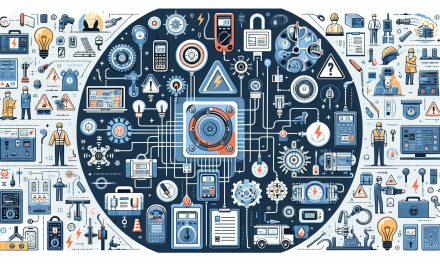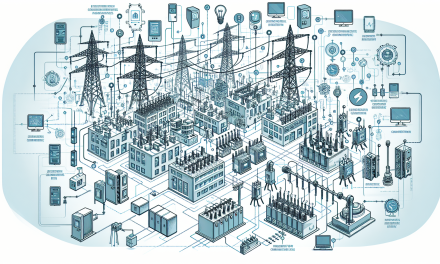Table of Contents
- Introduction
- Understanding the Importance of System Protection
- Key Aspects of Reliability in Power Systems
- Exploring Smart Grids and Their Impact
- Modern Electrical Power Systems
- Enhancing Efficiency with Advanced Technologies
- Cooling Towers: Operation and Maintenance
- Reliability and Operational Performance
- FAQs
- Conclusion
Introduction
Power system protection and reliability represent crucial elements in the efficiency of electrical engineering. Engineers strive to ensure that systems operate smoothly, safely, and efficiently to avoid interruptions. With growing demands on electrical grids, mastering the principles behind power system protection becomes even more vital. This guide aims to illuminate these principles, highlighting practical insights and essential techniques.
Understanding the Importance of System Protection
System protection in the context of electrical engineering serves as a safety net. It prevents faults, ensures stability, and preserves reliability. To illustrate this, consider that the repercussions of electrical failures can lead to significant economic losses, safety hazards, and prolonged downtime. Consequently, implementing robust protective measures guarantees not only the longevity of equipment but also the safety of personnel and the community.
Moreover, the integration of advanced technologies enhances these protective measures. Modern devices like microprocessors in relays and smart sensors provide engineers with the tools necessary to detect anomalies and respond swiftly, enhancing overall system performance.
Assessing Risks and Defining Protection Strategies
Risk assessment plays a pivotal role in establishing a protection strategy. By identifying potential failures, engineers can develop proactive measures. Techniques such as Fault Tree Analysis (FTA) or Failure Mode and Effects Analysis (FMEA) come into play. These methodologies enhance an engineer’s decision-making, ultimately leading to optimized protection plans.
Key Aspects of Reliability in Power Systems
Reliability in power systems encompasses numerous factors, encompassing availability, performance, and resilience. A dependable electrical system guarantees that end-users receive uninterrupted service, providing peace of mind while using various electrical devices.
Dimensions of Reliability
Moreover, when delving into reliability, we must consider its dimensions: component reliability, system reliability, and functional reliability. Each aspect influences the overall performance and is interconnected. For example, enhancing the reliability of components, such as transformers and circuit breakers, directly impacts system reliability.
Component Reliability
Component reliability ensures that individual units perform within defined parameters without failure. Engineers routinely perform maintenance and testing practices to extend the lifespan of these components. Such practices prove vital, as even a seemingly small malfunction can lead to widespread outages.
System Reliability
System reliability extends beyond individual components. It incorporates the interaction between various elements, ensuring that they function in harmony. An efficient control center can monitor and adjust operations, further boosting reliability.
Exploring Smart Grids and Their Impact
Smart grids stand at the forefront of modern electrical infrastructure. By leveraging digital communication, they enhance monitoring, control, and administration of the electrical supply. This transformation not only improves efficiency but also provides an adaptable framework for renewable energy sources.
Explore smart grids to understand how they integrate innovative technology to facilitate seamless power distribution while enhancing reliability.
Modern Electrical Power Systems
Power systems have evolved substantially, incorporating complex technologies to meet the ever-increasing demand. Advanced monitoring and control systems have risen from these advancements, allowing engineers to detect and respond to issues in real-time.
Furthermore, delving into modern electrical power systems provides insights into operational strategies that enhance reliability and performance.
Enhancing Efficiency with Advanced Technologies
Efficiency in electrical systems directly correlates with reliability. Today’s technologies play a critical role in optimizing performance. For instance, the utilization of advanced relay systems helps detect and isolate faults efficiently, minimizing outages and ensuring stability.
Moreover, introducing variable frequency drives (VFDs) allows for better control of motor functions, leading to energy savings and reduced mechanical stress. Thus, engineers can implement solutions that significantly increase operational efficiency.
Cooling Towers: Operation and Maintenance
Focusing on cooling processes is essential for maintaining optimal performance in power plants. Understanding cooling towers helps engineers address heat dissipation strategies that are crucial in maintaining efficient system operations.
Reliability and Operational Performance
Understanding the interplay between reliability and operational performance allows engineers to design systems that meet user expectations while remaining robust against failures. Emphasizing performance metrics facilitates continuous improvement, enabling organizations to adapt to changing needs successfully.
Additionally, exploring the crucial aspects of reliability and operational performance enhances the knowledge necessary for engineers aiming to master the complexities of electrical systems.
FAQs
What are the key components of power system protection?
The key components include protection relays, circuit breakers, and fuses. Each plays a critical role in detecting abnormalities and disconnecting faulty sections of the network.
Why is reliability essential in power systems?
Reliability ensures uninterrupted service delivery, minimizes downtime, and protects investments in equipment and infrastructure, thereby enhancing customer trust and satisfaction.
How do smart grids contribute to power system reliability?
Smart grids improve reliability through real-time monitoring, automated fault detection, and enhanced communication capabilities, allowing for swift responses to issues that arise.
Conclusion
In conclusion, mastering power system protection and reliability is imperative in today’s electrical engineering landscape. By understanding the fundamental principles, embracing advanced technologies, and prioritizing safety, engineers can enhance the efficiency and longevity of power systems. Incorporating insights from resources like Master Power System Protection & Reliability for Electrical Engineers further empowers professionals to navigate the complexities of modern energy demands. Accumulating knowledge in this field prepares engineers to embrace future challenges gracefully while fostering reliability and performance in electrical networks.





